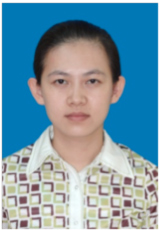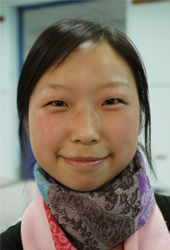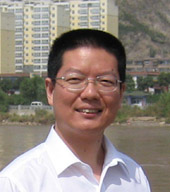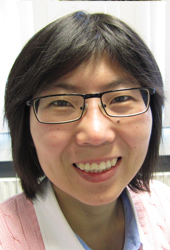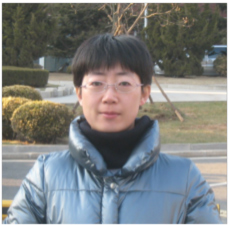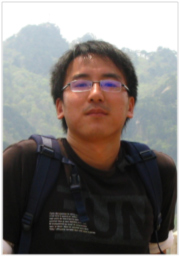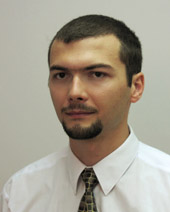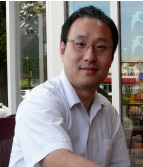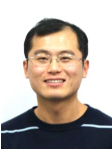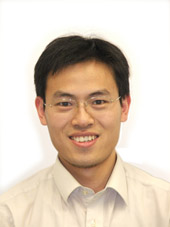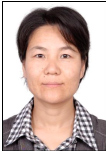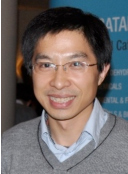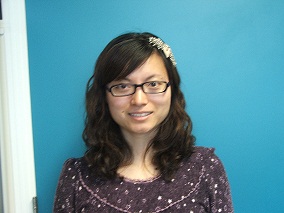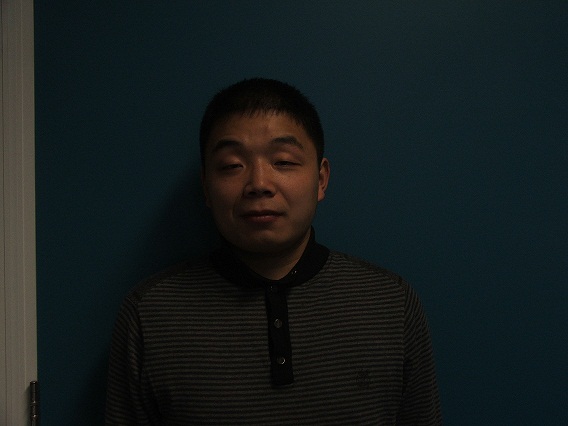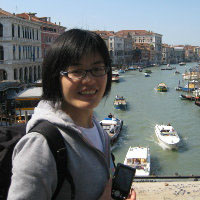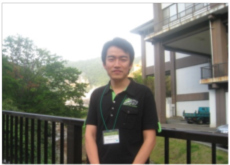Alumni
Meiling Guo
Visited Eindhoven from 27.01.2011 till 27.02.2012
She received her Bachelor degree from Jilin University in 2006 and then continued as a master-doctor continuous student at the State Key Laboratory of Catalysis, Dalian Institute of Chemical Physics from 2006 onwards and works on the application of UV and deep UV Raman spectroscopy in the zeolites synthesis. Her research interests are in the fields of the microporous materials including crystallization mechanism, characterization of active sites and their optical-electrical properties.
Dr. Guanna Li
Guanna Li was born in February, 1983. After finishing her bachelor degree in 2005, she started a master-doctor continuous project in State Key Laboratory of Catalysis, Dalian institute of chemical physics, Chinese Academy of Science (DICP, CAS), under the supervision of Prof. Can Li. During her PhD study, she participated in the Program for Strategic Scientific Alliances between China and The Netherlands (PSA). From Oct. 2009 to Oct. 2010, she was supported by PSA program as a guest PhD student in Inorganic Materials Chemistry group (IMC), Department of Chemical Engineering and Chemistry, Eindhoven University of Technology (TU/e), the Netherlands., She obtained her PhD degree from DICP In Oct. 2011 and then continuously worked on a double doctoral degree program between DICP and TU/e in IMC group, under the supervision of Prof. Rutger van Santen, Prof. Emiel Hensen and Prof. Can Li. Her research during this period was mainly focused on the development of fundamental understanding of the structures and catalytic properties of iron and copper exchanged high-silica ZSM-5 zeolites by computational methods. From March 2013, she is working as a postdoc researcher in the group of Prof. Emiel Hensen. The main interest she currently focusing on is transition metal modified zeolites for methane oxidation and biomass conversion.
Dr. Peng Liu
Postdoctoral research fellow at Eindhoven University of Technology, The Netherlands.
Visited Eindhoven from November 2009 until December 2013.
In my projects in Eindhoven I focused on the development of novel supported gold nanoparticle (AuNP) catalysts for green oxidation of alcohols: (1) Transition metal doped hydrotalcites were prepared and used as supports for gold nanoparticles. Chromium (III)-containing hydrotalcites were found to show novel and strong synergy with AuNP in achieving higher catalytic activity towards aerobic alcohol oxidation as compared to earlier optimal systems. (2) Efficient hydrotalcite-supported AuNP catalysts were developed for the aerobic oxidative tandem synthesis of methyl esters and imines from primary alcohols catalyzed under mild and soluble-base-free conditions. The catalytic performance can be fine-tuned for these one-pot reactions by simple adjustment of the Mg/Al ratio of the hydrotalcite support. (3) A ternary spinel supported AuNP catalyst was discovered to be highly active and selective for the gas-phase oxidation of ethanol to acetaldehyde. The catalyst is shown to be stable for at least 500 h, and the unprecedented catalytic performance is understood in terms of strong synergy between metallic gold and surface Cu+ species. (4) Photocatalytic reactions by using supported AuNP catalysts are currently developing. Another part of the work is focusing on the field of biomass conversion including (1) from bioethanol to 1-butanol and (2) from glycerol to glycerol carbonate.
Yi Zhang M.Sc.
Yi Zhang was born 1982 in Shijiazhuang (Hebei, China). After obtaining a B.Sc. in Environmental Engineering at the Beijing University of Aeronautics and Astronautics, she went to the Netherlands. She obtained a M.Sc. degree in Chemical Engineering and Chemistry at the Eindhoven University of Technology, worked for a year at Dow research in Terneuzen and then joined the PSA program in 2008. Her interest lies in photocatalysis and photoelectrochemistry. Early 2009 she visited the group of Can Li in Dalian.
Dr. Xin Zhou
Dr. Xin Zhou was born in 1977. She received her Ph.D. degree from Jilin University in 2005. From 2006 to 2010, she worked as a postdoctoral researcher in Prof. Weston T. Borden’s group in Department of Chemistry, Univeristy of North Texas, USA. During these four years, her research focused on using electronic structure calculations to understand and predict the reactions and properties of excited states of organic and organometallic compounds. In early 2010, she joined in Prof. Can Li’s group in Dalian Institute of Chemical Physics. Her recent research interests include theoretical investigation on photocatalysts being used in photocatalytic hydrogen production utilizing solar energy and computational study on photovoltaic cells based on nanomaterials, polymers, and small organic molecules.
Xiaobo Li
Visited Eindhoven from 27.01.2011 till 27.02.2012
He received his bachelor degree from Fuzhou University in 2007, then became PhD student at the State Key Laboratory of Catalysis, Dalian Institute of Chemical Physics. His research field is synthesis, characterization and catalytic application of metal nanoparticles supported on porous solids.
Dr. Bartek Szyja
Postdoctoral researcher in the PSA program at the Eindhoven University of Technology
Bartłomiej Szyja was born on 19 November 1976 in Kielce (Poland). He started his education there, and after passing his maturity exam in 1995, he moved to Wrocław, where he started studying chemistry at the Faculty of Chemistry of Wrocław University of Technology. He graduated in 2000, after defending his Master's Thesis entitled “Diffusion and adsorption in microporous materials”. He continued his work on modeling adsorption and diffusion phenomena as a PhD student in Institute of Chemistry and Technology of Petroleum and Coal. After defending his Doctor's Thesis entitled “Modeling of physicochemical phenomena in γ-Al2O3 catalyst”, he started working in Department of Chemistry and Technology of Fuels in 2004 as a research and teaching assistant. From 2006 onwards he is a post-doctoral researcher in the PSA program at Eindhoven University of Technology, where he is studying zeolite synthesis processes using molecular modeling methods.
Dr. Haidong Zhang
Dr. Haidong Zhang
Associate Professor at the Laboratory of Applied Catalysis
Chongqing Technology and Business University, China
Visited Eindhoven in 2006
In Eindhoven my work focused on two aspects. One is tunable synthesis of nano-particles of ordered mesoporous materials different pore size, channel length and morphology. Another one is the immobilization of homogeneous Jacobsen catalysts in the channels of ordered mesoporous materials and the studies on the heterogeneous chiral epoxidation of unfunctionized alkenes catalyzed by these organic-inorganic hybrid catalysts.
I synthesized mesoporous materials with short SBA-15 channels and special morphology as 3-D nano-tubes. Furthermore, I immobilized the Mn(salen)Cl complex in the nanochannels of different mesoporous silica materials and experimentally proved the channel effect of supports on the product contribution, which is different in homogeneous and heterogeneous reaction systems.
I started my academic career at the Chongqing Technology and Business University, where I focus on applied catalysis.
Dr. Hongchuan Xin
Visited Eindhoven in 2008.
During my work in Eindhoven I evaluated a whole range of methods to impart substantial mesoporosity in ZSM-5 zeolites. Such novel zeolites with a hierarchical pore structure have beneficial properties in catalysis. Not only does the high interconnectivity of micropores and mesopores reduce mass transfer limitations but it also improves the negative effects of coke deposition. The highlight of this work is the synthesis of a hierarchical zeolite for phenol production with a five time higher space time yield than the best catalyst reported so far.
After my stay in Eindhoven, I was a postdoctoral research fellow in the group of Prof. Ryong Ryoo at KAIST in Korea.
Dr. Yejun Guan
Researcher at University of Twente, The Netherlands
Visited Eindhoven in 2006
In my PhD work in Dalian and Eindhoven I focussed on the possibilities to use nanostructured ceria as catalysts and catalyst supports. The work in Eindhoven involved mainly the exploration of catalysis by gold for such diverse reactions as butadiene hydrogenation, alcohol oxidation in the gas and liquid phase and CO oxidation.
After completion of my PhD work in China, I returned to Eindhoven University for a postdoctoral research position for two years. Currently, I am a researcher in the group of Prof. Lefferts at the University of Twente.
Jie Yang
PhD student at Delft University of Technology, The Netherlands
Visited Eindhoven in 2009
During my stay of 6 months in Eindhoven I developed basic metal carbonates as a novel support for gold nanoparticles. Typically, soluble bases are added during liquid-phase alcohol oxidation by gold catalysts. This put an environmental constraint on the use of such catalytic systems. By replacing the soluble base by a solid one, which concomitantly acts as support for the gold nanoparticle, improved catalysts were obtained.
My stay in Eindhoven gave me the possibility to orient myself towards a PhD position. I started in the group of Prof. Dingemans at Delft University to work on hydrogen storage materials in 2009.
Keju Sun
Researcher at AIST, Japan
Visited Eindhoven as one of the first exchange students in 2005
In Eindhoven, I started to use DFT calculations to study the adsorption of CO on Mg-exchanged mordenite. After my return to DICP, I combined this theoretical work with experimental IR studies. We were able to assign the CO adsorption bands in the IR spectrum of Mg/mordenite on the basis of these DFT calculations.
Since 2009 I am working as a postdoctoral research fellow at Advanced Industrial Science and Technology (AIST) in Tsukuba, Japan.
Meiqin Li
Visited Eindhoven in 2010
During my stay of 3 months in Eindhoven I used my knowledge in synthetic organic chemistry to develop novel templates, which are used to prepare new zeolite nanostructures. A typical zeolite for ZSM-5 synthesis is tetrapropylammonium. By virtue of linking two tetrapropylammonium ions together with a hydrophobic tail it becomes possible to synthesize very thin zeolite nanosheets with a thickness of only 1-2 unit cells. My work involved the synthesis of these templates with 2, 3 and 4 nitrogen bases, their purification and characterization.
Prof. Dr. Ying Li
Professor at Zheijang University of Technology, Hangzhou, China
Visited Eindhoven in 2005 and 2006.
Ying’s work focused on the design and synthesis of metal-functionalized mesoporous materials. Accurate control of the synthesis of SBA-n class materials allows the introduction of iron sites varying from isolated sites in the silica network (acid catalysis) via isolated surface sites (oxidation catalysis) to iron oxide/silica composites (novel support materials). We were the first to show that it is possible to prepare a catalytically active Fe/SBA-15 material for selective oxidation of benzene to phenol.
After my stay in the Netherlands, I was appointed associate professor and recently full processor at Zheijang University. My current research interests are in the field of synthesis and catalytic application of new functional carbon materials and carbon supported noble metal catalysts for hydrogenation, especially the exploitation and industrialization of Ru and Fe based catalysts for ammonia synthesis and C1 chemistry.
Dr. Peiyuan Wang
Assistant Professor of Zhengzhou University of Light Industry
Visited Eindhoven from September 2009 until September 2010
Peiyuan Wang was working as a research fellow in Eindhoven within the framework of the Programme Strategic Scientific Alliances between China and the Netherlands. He prepared FeZSM-5 and CuZSM-5 by the ion exchange method. He investigated the adsorption and desorption properties of methanol on Fe- and Cu-exchanged ZSM-5 in order to learn more about the mechanism of selective oxidation of methane.
After spending one year in Eindhoven as a research fellow, Peiyuan continued in academia at the Henan Provincial Key Laboratory of Surface & Interface Science, Zhengzhou University of Light Industry in Zhengzhou, China.
Dr. Keqiang Sun
Associate Professor at Tsinghua University, Beijing, China
Visited Eindhoven in 2005
Keqiang Sun visited Eindhoven in 2005 to work on selective oxidation reactions by Fe/ZSM-5 catalysts. He has identified the active sites by several titration techniques in combination with spectroscopic techniques. A major advance of this work is that it extends the range of relevant Fe loadings from the conventional low loadings to high loading and established quantitative structure-activity relations.
After finishing his post-doc, Keqiang became associate professor at Tsinghua University, where his main interest is in the field of metal catalysis.
Dr. Lei Zhang
Research chemist at BASF, The Netherlands
Visited Eindhoven as one of the first PhD students in 2005
My work at Eindhoven was focused on the design and synthesis of heterogeneous catalysts with nano-building blocks, polyhedral oligosilsesquioxane (POSS). During my stay, we developed a novel method for the synthesis of heterogeneous catalysts by immobilizing Titanium-POSS compounds onto a polymer-coated mesoporous silica support. Such a method has combined the advantages of porous inorganic support materials and organic support materials.
After a postdoc in the group of Krijn de Jong at Utrecht University, I started working for BASF (De Meern) in the Netherlands.
Dr. Kourosh Malek
Research Officer at NRC Institute for Fuel Cell Innovation and adjunct faculty at Department of Chemistry, Simon Fraser University, Vancouver, Canada
Was research associate in 2005 and 2006 at the Eindhoven University of Technology, The Netherlands
Immobilized metal complexes on nanoporous materials have recently been proposed as a novel class of heterogeneous enantioselective catalyst for epoxidation of unfunctionalized olefins as well as hydrogenation, alkylation, and nitroaldol reactions. The porous hosted materials affect catalytic performance due to a cooperative interaction among the nanoporous solid, immobilizing linker, and metal complex asymmetry. Molecular simulations (i.e. molecular dynamics and DFT calculations) were employed to investigate the origin of enantioselectivity of an anchored metal complex [oxo-Mn(V)-salen] in nanoporous marterials (MCM-41). The chirality of the complex was quantitatively evaluated with "continuous chirality measure". We showed that the immobilized linker enhances the enantioselectivity of the catalyst due to increasing "chirality content" of the salen-complex. These studies provide new insights into the steric effects that relate to choices of substrate and linker and to the interplay with mesopore confinement. This type of analysis is useful for the interpretation of the enantioselectivity as well as in the design of heterogenized enantioselective homogeneous catalysts.
Dr. Yi Ma
Dr. Yi Ma was born on March 12, 1984 and she received her Bachelor degree from the NorthWest University in Xi'an China in 2006 and received her Doctor degree at State Key Laboratory of Catalysis, Dalian Institute of Chemical Physics in 2013 for photocatalytic hydrogen production on TiO2 based materials.
Her research field is in Photocatalytic reactions for selective oxidation.
Qiang Guo
Visited Eindhoven from 06.04.2012 till 05.04.2013
He received his bachelor degree from Sichuan University in 2007 and then became a PhD student at the State Key Laboratory of Catalysis, Dalian Institute of Chemical Physics, Chinese Academy of Sciences. His research interests are in the fields of the microporous materials including in-situ characterization, heterogeneous catalysis and zeolite synthesis.
Dr. Yanmei Zhang
Associate professor in Dalian Nationalities University, China
Postdoctoral researcher in the PSA program at the Eindhoven University of Technology from 01.2009 till 12.2010
During stay in Netherlands, My work mainly focused on the design and synthesis of heterogeneous catalysts. Firstly, we developed novel catalysts for the synthesis of heterogeneous acid catalysts by immobilizing Phosphotungstic Acids into Metal-organic Frameworks, which are active and recyclable in fructose dehydration into HMF. Then, Palladium nanoparticles entrapped in polymeric ionic liquid microgels were prepared as recyclable hydrogenation catalysts.
After my stay in the Netherlands, I was appointed assistant professor and recently associate professor at Dalian Nationalities University. My current research interests are in the field of biomedical applications of nanomaterials.
